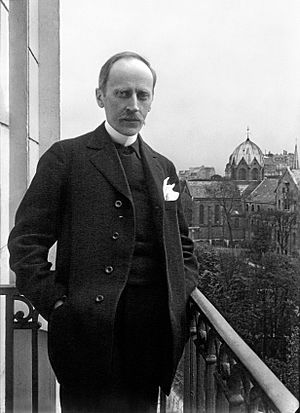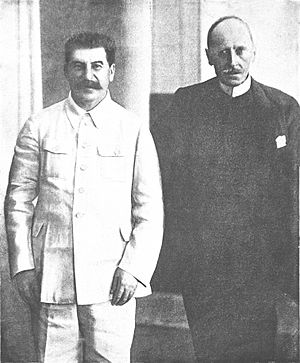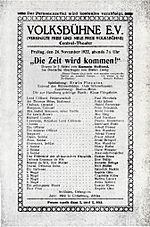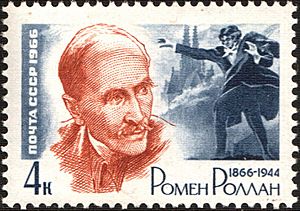Romain Rolland facts for kids
Quick facts for kids
Romain Rolland
|
|
|---|---|

Romain Rolland, 1914
|
|
| Born | 29 January 1866 Clamecy, France |
| Died | 30 December 1944 (aged 78) Vézelay, France |
| Occupation |
|
| Period | 1902–1944 |
| Notable awards | Nobel Prize in Literature 1915 |
| Spouse | Jify Romain Rolland, m. 1934-1944; Clothilde Bréal m. 1892-1901 |
| Relatives | Madeleine Rolland (sister) |
| Signature | |
 |
|
Romain Rolland (French: [ʁɔmɛ̃ ʁɔlɑ̃]; 29 January 1866 – 30 December 1944) was a French writer. He wrote plays, novels, and essays. He was also interested in art history and music. In 1915, he won the Nobel Prize in Literature because of his inspiring writing and how he showed different kinds of people with kindness and honesty.
Rolland was a strong supporter of Joseph Stalin in France. He also had important conversations with the famous psychologist Sigmund Freud.
Contents
Romain Rolland's Life Story
Romain Rolland was born in Clamecy, Nièvre, France. His family included both wealthy townspeople and farmers. He once wrote that he saw himself as representing an "old kind of person." He even wrote about his ancestors in his book Colas Breugnon (1919).
In 1886, he was accepted into the École normale supérieure, a famous French school. He first studied philosophy, but he decided to stop because he wanted to think for himself. He earned a history degree in 1889. Then, he spent two years in Rome, Italy. There, he met Malwida von Meysenbug, who was friends with famous people like Friedrich Nietzsche and Richard Wagner. He also discovered many Italian art masterpieces. These experiences greatly shaped his ideas.
When he returned to France in 1895, he earned his doctorate degree. His thesis was about the history of opera in Europe. For the next 20 years, he taught in schools in Paris. From 1902 to 1911, he led a new music school. In 1903, he became the first professor of music history at the Sorbonne.
Rolland's first book was published in 1902 when he was 36. He believed in making theatre available to everyone, which helped make theatre more democratic. He was a humanist, meaning he believed in human values and dignity. He was also interested in the ideas of Indian philosophers, like Rabindranath Tagore and Mahatma Gandhi. Rolland was especially influenced by the Vedanta philosophy from India, mainly through the works of Swami Vivekananda.
Even though he was a demanding person, Rolland was shy. He didn't enjoy teaching much. However, he cared about young people. The main characters in his novels, like Jean-Christophe and Olivier, are young. But in real life, he kept a bit of distance from others. He was mostly a writer. In 1912, he left his university job, sure that writing would give him enough money to live.
Romain Rolland was a pacifist his whole life, meaning he believed in peace and was against war. He was one of the few French writers who kept his peaceful, international views during World War I. He moved to Switzerland and protested against the war in his book Au-dessus de la mêlée (1915), which means Above the Battle. In 1924, his book about Mahatma Gandhi helped make the Indian leader famous for his nonviolent actions. Rolland and Gandhi met in 1931. Rolland was also a vegetarian.
In 1922, he attended a meeting for progressive artists and signed a statement to create a union of international artists. In 1928, Rolland and a Hungarian scholar named Edmund Bordeaux Szekely started the International Biogenic Society. This group promoted ideas about connecting the mind, body, and spirit.
In 1932, Rolland became one of the first members of the World Committee Against War and Fascism. He moved to Villeneuve, Vaud, by Lake Geneva, to focus on his writing. His life had some health problems and trips to art shows. In 1935, he visited Moscow after being invited by Maxim Gorky. There, he met Joseph Stalin, whom he thought was the greatest man of his time. Rolland acted as an unofficial representative for French artists in the Soviet Union. Even though he admired Stalin, he tried to help his friends who were being treated unfairly. He tried to talk to Stalin about his worries and asked for mercy for people like Victor Serge and Nikolai Bukharin.

In 1937, he moved back to Vézelay. In 1940, the Germans occupied Vézelay during World War II. Rolland lived in complete solitude during this time. He kept working and finished his memoirs in 1940. He also completed his research on the life of the composer Ludwig van Beethoven. Shortly before he died, he wrote Péguy (1944). In this book, he looked at religion and socialism through his own memories. He passed away on 30 December 1944, in Vézelay.
In 1921, his close friend, the Austrian writer Stefan Zweig, wrote a book about Rolland called Romain Rolland: The Man and His Works. Zweig greatly admired Rolland, calling him "the moral conscience of Europe" during the difficult years of war. Zweig also wrote about their friendship in his own autobiography, The World of Yesterday. He mentioned their failed attempts to organize a meeting of anti-war thinkers from both sides of the war in neutral Switzerland.
Victor Serge, whom Rolland helped, was thankful but also disappointed that Rolland didn't publicly criticize Stalin and the Soviet government. Serge wrote in his notes after Rolland's death that Rolland, at 70, allowed himself to be associated with the violence of a government he admired.
The famous writer Hermann Hesse dedicated his novel Siddhartha to Romain Rolland, calling him "my dear friend."
Ideas for a People's Theatre
Rolland's most important idea for theatre was his call for a "popular theatre." He wrote about this in his essay The People's Theatre (Le Théâtre du peuple, 1902). He believed that for a new theatre to appear, "the stage and auditorium should be open to the masses." This meant that theatre should be for everyone, not just a few people. The book was published in 1913, but many of its ideas were shared earlier. Rolland tried to use his ideas in his plays about the French Revolution, like Danton (1900). His ideas became very important for future theatre creators.
| "The people have been gradually conquered by the bourgeois class, penetrated by their thoughts and now want only to resemble them. If you long for a people's art, begin by creating a people!" |
| Romain Rolland, Le Théâtre du peuple (1903). |
His essay was part of a larger movement around that time to make theatre more democratic. Many "People's Theatres" opened across Europe. Rolland was inspired by Maurice Pottecher, who also believed in theatre for everyone.
Rolland's ideas were stronger than Pottecher's. Rolland criticized the wealthy class for taking over theatre and making it less meaningful. He suggested that a people's theatre should show "an epic historical theatre of 'joy, force and intelligence'." This kind of theatre would remind people of their revolutionary past and inspire them to build a better society. Rolland thought that people would improve by seeing heroic stories from their history. He also believed that happy and free people need celebrations more than theatres. He felt that a happy people would see themselves as the best show.

Some of the most important theatre directors of the 20th century, like Max Reinhardt and Erwin Piscator, staged Rolland's plays. Piscator directed the first performance of Rolland's play The Time Will Come (written in 1903) in Berlin in 1922. This play explored the connections between powerful nations and money, how enemy civilians were treated, and the use of concentration camps. It showed these ideas through a story from the Boer War.
Romain Rolland's Novels
Rolland's most famous novel is a 10-volume series called Jean-Christophe (1904–1912). This long story combines his interests and ideas through the life of a German music genius. This character moves to France and becomes a way for Rolland to share his thoughts on music, social issues, and understanding between different countries.
His other novels include Colas Breugnon (1919), Clérambault (1920), Pierre et Luce (1920), and another long series of 7 volumes called L'âme enchantée (1922–1933).
Romain Rolland's Academic Work
Romain Rolland was a history teacher at schools like Lycée Henri IV and Lycée Louis-le-Grand. He was also a member of the École française de Rome. Later, he became a professor of Music History at the Sorbonne and a History Professor at the École Normale Supérieure.
Letters with Richard Strauss
In 1899, Rolland began writing many letters to the German composer Richard Strauss. At that time, Strauss was a famous conductor of music by composers like Wagner and Mozart. In 1905, Strauss finished his opera Salome, which was based on a play by Oscar Wilde. Strauss wanted to create a French version of Salome that was very close to Wilde's original French text. He asked Rolland for help with this project.
Rolland was not sure at first, but they exchanged many letters. In the end, Rolland made 191 suggestions to improve the opera's text. The French version of Salome was first performed in Paris in 1907. After this, Rolland's letters often discussed Strauss's operas. He sometimes even criticized Strauss's writer, Hugo von Hofmannsthal, for not having a good sense of theatre.
Rolland was a pacifist. He agreed with Strauss when Strauss refused to sign a statement from German artists and thinkers that supported Germany's role in World War I. Rolland wrote in his diary that Strauss believed artists should focus on their creations, not on war and politics.
Letters with Sigmund Freud
In 1923, Rolland began writing letters to the famous psychologist Sigmund Freud. Rolland admired Freud, and Freud admired Rolland just as much. Freud even wrote to Rolland, saying that exchanging greetings with him would be a happy memory forever.
Through these letters, Rolland introduced Freud to the idea of the "oceanic feeling." This is a feeling of being connected to everything, like a boundless ocean. Rolland developed this idea from his study of Eastern mysticism. Freud started his next book, Civilization and its Discontents (1929), by discussing this feeling. He mentioned that an anonymous "friend" had told him about it, and this friend was Rolland. Rolland continued to be a big influence on Freud's work, and they kept writing to each other until Freud's death in 1939.
Images for kids
See also
- List of peace activists
- In Spanish: Romain Rolland para niños
 | Jessica Watkins |
 | Robert Henry Lawrence Jr. |
 | Mae Jemison |
 | Sian Proctor |
 | Guion Bluford |



